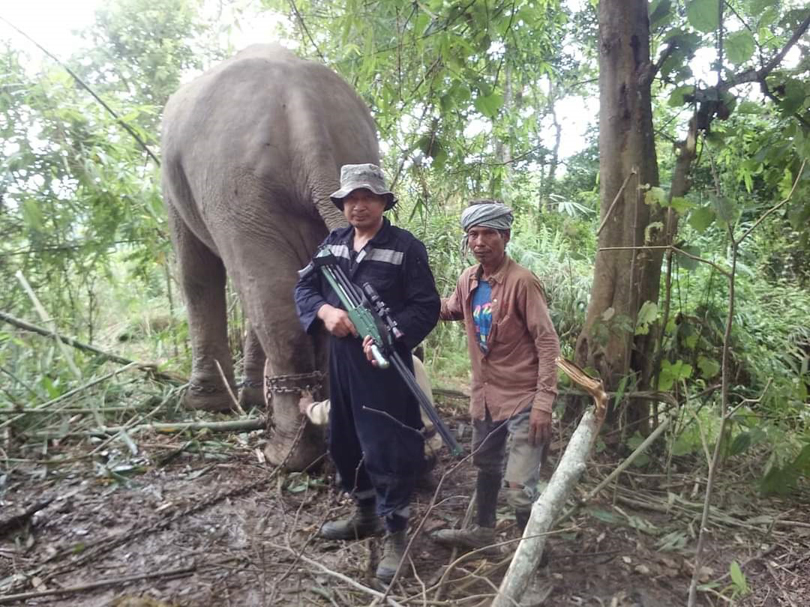Share

DIMAPUR— Collaring and tranquilizing an elephant can be an extremely difficult task not only because its huge size but also the possibility of the animal turning violent. It takes a team to get the job done, ensuring that neither the elephant nor team members are injured.
Veterinary assistant surgeon, Dr. Michael Imti Imchen told Eastern Mirror that tranquilizing elephant is not only expensive but also time consuming and dangerous. ‘And of course, one has to be able to run fast,’ he quipped.
Imchen, who is trained in elephant healthcare management and presently the only veterinarian in Nagaland to tranquilize elephants, has so far (since 2016) darted around 15 elephants, mostly in Peren district.
“Have you heard of anyone travelling by an excavator? Our team, the A Team, comprising three to four Forest guards and me have travelled on an excavator,” he said, adding that they sometimes jest and call themselves ‘The suicide team’ because of the dangerous nature of their work.
It takes days for the team to collar an elephant, risking themselves in the rough terrains and sometimes even being attacked and chased after by the animal.
[bsa_pro_ad_space id=1]‘I have travelled to places where there are no roads; travelled on an excavator, walked 30 km on foot to vaccinate and scouted for three days for elephant. While on a mission to tranquilize an elephant, I have come face-to-face with an elephant in a ‘do or die situation’,’ he narrated.
According to Imchen, an average period of 30 minutes is what a veterinarian has from the moment a tranquilizer punctures the elephant’s thigh or buttock region, and they have to relocate or attend to the jumbo with the medication required during this short window period.
Tranquilizing an elephant also depends on the area, he said. For plain areas, they use a certain drug where the animal will collapse but for hilly terrain they use different drug where the elephant can remain sedated in standing position.
He said the team studies the terrain, look for the ideal ambush spot and also plan escape routes for the team before carrying out tranquilizing exercise.

The veterinarian elucidated that when male elephants attain a certain age, some as early as 18 or 19 years, they go into musth, which is a condition of heightened aggression and unpredictable behaviour due to a surge in testosterone level, thereby posing risk to human lives as well damage to property and crops.
He said the owners of domesticated elephant or elephant mahouts have to be very careful during this period when secretion is emitted from the temporal gland located midway between the eyes and the ears, as the jumbo becomes fearless and has the tendency to attack.
“There have been lots of reports and instances where the caretakers have been killed by elephants during their musth period. So if the mahout or the owner observes and notice the secretion, they should restrain them with chains. If we do that, psychologically they become fearful, if not they will start attacking,” he explained.
In Nagaland, most of the domesticated elephants, which are primarily engaged in logging works, are found in Wokha, Peren and Niuland districts, with the total number in the state estimated to be 40 to 50.
The veterinarian, however, pointed out that most of the elephant owners are irresponsible and have no proper knowledge of how to rear it.
“Most of the elephant owners or the mahout are least bothered for the routine check-up and medication of the elephants although they are making money from the elephants,” Imchen lamented.

He went on to say that when medication is not used, the elephants in musth can remain aggressive for months. The animal has to be vaccinated for anti rabies, undergo regular de-worming and given tetanus vaccine every six months.
Detailing on how the process of tranquilizing is carried out, he said, “When there is a report of elephant in musth, the owner reports it to the Wildlife division of Forest and Environment department, after which verification of papers is done. If the papers are legitimate, I am informed about the report, and after the paperwork, we plan for the operation and go to the spot.”
The expenditure of the tranquilizing exercise is covered by the owners, he added.